Composer ROBERT SIMPSON
A conversation with Bruce Duffie
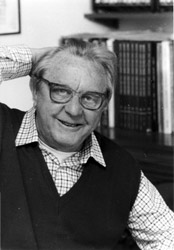
Composer ROBERT SIMPSON
A conversation with Bruce Duffie

Robert Simpson was born on March 2, 1921 in Leamington Spa, England. His early education was at Westminster City School, and he played in brass bands. Of Dutch and Scottish descent, his family prepared him to follow the path of a noted ancestor, who was a pioneer in anesthetics, and become a medical doctor. Robert served in a mobile surgical unit during World War II as a conscientious objector, while studying music with Herbert Howells. Simpson earned a doctorate of music from the University of Durham in 1951, and was founder of the Exploratory Concert Society. This led to his joining the BBC as broadcaster and producer until 1980, when he resigned in protest over corporation policies. He moved to Ireland where he continued to compose until his death in November of 1997.
Among his legacy are 11 symphonies and 15 string quartets, most of which are now available as recordings on the Hyperion label, sponsored by the Robert Simpson Society. The award-winning Ninth Symphony was sponsored by the Rex Foundation of San Francisco, which administers the charitable activities of the rock group, "The Grateful Dead." Simpson thereafter called himself, "The Grateful Living." He also created other chamber works, a few concerti, piano pieces, and works for band, some of which are also recorded.
During his lifetime, Simpson championed the works of Bruckner and Nielsen, and encouraged his countryman Havergal Brian, arranging performances of all 32 of his symphonies, some of these being premieres. He was also a keen amateur astronomer, becoming a fellow of the Royal Astronomical Society.
The Robert Simpson Society was founded in 1980 with the distinguished Danish composer Vagn Holmboe as President until his death in 1996, when John McCabe accepted the Society's invitation to lead it. The Simpson Society Archive is housed in the library of Royal Holloway College, University of London, England.
This interview with Robert Simpson was done via telephone in January
of 1991, not long before his debilitating stroke. From my home in
Chicago, I called the composer, whose home on the coast of Ireland was
being battered by a heavy storm . . . . .
Bruce Duffie: Robert Simpson? This is Bruce Duffie in Chicago. How are you?
Robert Simpson: I'm fine, thanks. We're having a tremendous storm at the moment.
BD: Ah, well we're getting a little bit of snow and that's about all.
RS: I'm a little surprised you got through because the telephones here may be at risk. We're having force 11 hurricane winds.
BD: I got through on the first try, as a matter of fact.
RS: Can you hear me all right?
BD: Yes, you're coming through very loud and clear. Can you hear me all right?
RS: Yes, fine.
BD: Good, good. Let us get started then . . . . . You spent almost 30 years with the BBC producing classical music programming. Was this new music or old music or both?
RS: All kinds. All kinds of serious music, that is. I started when the BBC third program was in full swing. It had been going for about 4 years and was a very adventurous, marvelous thing. It happened nowhere else before in the world so it was very exciting to work on. We used to do all sorts of things that had been very neglected or too expensive to be done before. I remember Berlioz' Trojans, for instance, for the first time on the radio with Beecham. That was very exciting. The third program wasn't only a music program. It was also drama and talks and science and philosophy. All kinds of subjects on that level.
BD: Were you responsible for anything besides the music?
RS: No, only the music. I wasn't responsible for all the music, of course. I was just one of the staff who was doing the work.
BD: Because you were, even at that time, a noted composer yourself, did you have a lot more sympathy for new music?
RS: Well, yes, naturally. I had a fellow feeling for other sufferers. But, on the other hand, the composer is not the person really to ask such questions because he tends to follow his own bent. He plows his own furrow and he takes what he needs and tends rather to ignore the rest. I wasn't able to do that. Being in the BBC, it was my job to listen to everything, to hear as much as I could - everything that was going on - and to represent it in the programs whether I liked it or not.
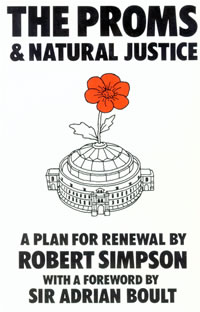 BD:
Then how did you decide from amongst the possibilities, which you would
select for broadcast?
BD:
Then how did you decide from amongst the possibilities, which you would
select for broadcast?
RS: We would discuss all these things. We had plenty different opinions and it came out in the wash. Sometimes, perhaps, we did things that should not have been done and we didn't do things that should have been done, but everyone makes mistakes. I think on the whole, though, we got a pretty good spectrum. I think the BBC at that time broadcast a wider spectrum of contemporary music than anywhere else in the world.
BD: Is that still the case today?
RS: I'm not sure about it today. I think all that idealism has been abandoned. I think it started to go wrong when the BBC started having to compete with the commercial radios and television that were coming onto the scene. When they competed for large audiences, standards dropped.
BD: One of the biographies I read of you says that you left over disagreements over policy. What were the policies that you disagreed with?
RS: Well, it was partly begun by the fact that the BBC's cultural standards were being abandoned to some extent. It was partly for financial reasons and I think partly because the people at the top of the BBC weren't the kind of people who were interested in them at all. They were interested in sports, in news, current affairs, the sort of thing that would attract the mass audience, and so they began to starve out the cultural activities in the corporation. Then in 1980, there was a move to abolish 5 of the BBC orchestras and throw all of these musicians out of work. There was a musicians-union strike at the time and it was really the last straw for me. I just resigned in protest and said what I thought of the BBC.
BD: If you could write your own ticket today, if you were completely in charge of the whole thing, how would you organize the BBC now?
RS: I don't know. The whole problem is so different. The world we live in now is different from the one that I lived in then. Now, getting towards being an old man, I hesitate to make suggestions of that kind. I certainly think that I would try to make the BBC again the center of broadcasting in Britain, in the sense that it was maintaining standards rather than merely competing with other people for the lowest common denominator. It sounds snobbish, but it isn't really, because I think that no country can call itself civilized if it hasn't got these things which should be there. They ought to be there even if nobody wants them.
BD: Then who should be deciding what the standards should be? Is it the cultural administrator or the public or composers or who?
RS: I think in a broadcasting organization, you have to have a staff which is educated and experienced and knows its stuff - knows what there is and knows how to discuss intelligently what is to be produced. I think we did in the days of the Third Program just following the war - in the late 40s and early 50s. Those are the times we had a real feeling of conviction about what we were doing, and we didn't consider how many people were listening. We considered, really, whether the thing we were doing was worth doing regardless of box office, regardless of financial considerations.
BD: Was there a sense that you were writing history?
RS: Yes. We were. What we were doing was the envy of the whole broadcasting world, and it was, to some extent, imitated later on in Germany and France, but very few other places. You ask me what I would do now and that's a rather impossible question because all those things have been so much eroded and the situation has deteriorated to such an extent that it would be a rather hopeless task, I think, trying to restore it.
BD: I see. You'd need a magic wand to put it back.
RS: I think you would, yes.
* * * * *
BD: Let's come ‘round to something a little more pleasant - that is, your music. You have spent your entire life composing music that has a tonal center - tonal music - and now it seems that style is coming back into fashion. Is that pleasing for you?
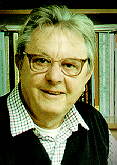 RS:
Well, first of all, I'd say that my music hasn't always got a tonal center
in the old sense, the classical sense. For instance, some of my works I
wouldn't be able to tell you what key they were in. But one thing they
do is to respect the nature of the intervals themselves. I think a lot
of contemporary music doesn't do that. And I try to see what kind of energy
can be got from the differences between, say, the 4th and the 5th and the
3rd and the 7th and all the intervals between the notes. They create resonances
which created tonality in the first place and there are new ways of looking
at that. Now that is a question of how they sound - it's not a question
of making patterns on paper with them. It's a question of deriving energy
from the actual sounds themselves, from the intervals. And then in the
last decade or 15 years or so, I've been doing more and more along those
lines and writing in definite keys as the classical composers did. But
what I'm doing, I think, derives from them rather than from some of the
experiments of the present day.
RS:
Well, first of all, I'd say that my music hasn't always got a tonal center
in the old sense, the classical sense. For instance, some of my works I
wouldn't be able to tell you what key they were in. But one thing they
do is to respect the nature of the intervals themselves. I think a lot
of contemporary music doesn't do that. And I try to see what kind of energy
can be got from the differences between, say, the 4th and the 5th and the
3rd and the 7th and all the intervals between the notes. They create resonances
which created tonality in the first place and there are new ways of looking
at that. Now that is a question of how they sound - it's not a question
of making patterns on paper with them. It's a question of deriving energy
from the actual sounds themselves, from the intervals. And then in the
last decade or 15 years or so, I've been doing more and more along those
lines and writing in definite keys as the classical composers did. But
what I'm doing, I think, derives from them rather than from some of the
experiments of the present day.
BD: So then you took and worked with what you had and brought it farther along, rather than starting with something new?
RS: Yes. People sometimes call me a conservative for that, but I regard myself as a conservationalist.
BD: That's in vogue today. (Both laugh).
RS: Well, I'm not interested in vogue. I think "vogue" has ruined composers. Composers have often been in vogue and then faded out. What's in fashion is not important. What is in the substance of the music is what is important. That is what I would try to preserve or try to achieve. And, well, if people want it, that's nice. If they don't, at least I've done my best.
BD: Do you expect to have an audience for your music?
RS: I would hope so, naturally. I think that if you write music, you don't write it in a vacuum. You write it for people. Music is for people, not for experts so you hope that someone will cotton on to what you're doing and that someone will respond to it. This seems to be happening, I think, now.
BD: Have all of your pieces been performed publicly?
RS: Yes. I don't think there's been anything - except things that are still waiting for a performance.
BD: But essentially, they've all been done. Nothing's lying in a drawer?
RS: No, no. Everything's sort of alive at the moment.
BD: Then have you basically been pleased with the performances you've heard of your music over the years?
RS: They vary. They vary. Chamber music performances are always much better, of course. A string quartet, for instance, will live with a piece before they play it. They'll work on it for weeks, months, and then when they play it, they'll know it by heart. For an orchestra, of course, if you get a first performance of a symphony, the players see it for the first time 2 days before the concert. So at the concert, they're still hanging on for grim death, counting and watching the beat and sitting on the edge of their seat, and the chances are that very little of the music will come across even though the notes may be accurate. So orchestral music is less likely to be successfully performed the first time than chamber music. As far as orchestral music is concerned, I tend to get along with Schoenberg who said his music is not difficult. It's only badly played.
BD: (Laughs) Well, I assume that occasionally yours is brilliantly played.
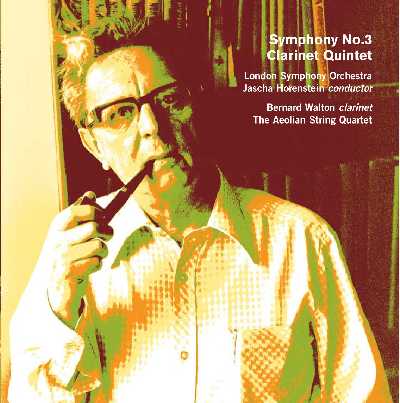 RS:
Sometimes, of course. Especially on records where they get a chance to
get it right.
RS:
Sometimes, of course. Especially on records where they get a chance to
get it right.
BD: I was going to ask if you were pleased with the records because they have a little more permanence than a concert that is given and gone.
RS: Yes. I've been very delighted with Vernon Handley and the works that have been recorded so far. He's a marvelous conductor. You ought to know more of him in America. You should have him conduct something over there. He's a marvelous conductor and he understands my music right from the word go. He really wants to do it. He wants to understand it. He wants to get inside it. And what I like very much about him is that he's always got positive ideas of his own which shows that he's thought about the music. He's not really a person who mechanically wants to reproduce what the composer is asking for. He's got qualitive, substantive ideas which are discussed with you and he asks you about. He's very stimulating and interesting to work with.
BD: Then how much interpretation do you expect on the part of the performers – either the quartet players or the conductor, or even the members of the orchestra?
RS: A lot. A lot. I think if a piece of music's got anything in it, there are going to be a million ways of playing it. There's not just one way of playing the Eroica Symphony, is there? We've had many different interpretations of it and I think the best ones, the strongest ones, the ones with the most consistency will have a lot of differences between them. And I think that Beethoven would probably have been very interested in all of them.
BD: You don't find, then, that perhaps a recording of one of your works might hamper a little of the creativity as they strive to make a live performance a duplicate of the disc?
RS: Well, I don't think anybody who's going to do that has got much in him anyway. I think that a conductor or a performer who wants to perform it will learn it from the score and form his ideas about it. I often find most of them don't want to hear a recording of it before they play it. They don't want to be influenced or disturbed with somebody else's conception of it. They want to form a strong idea of their own.
BD: Then listen to the recording afterwards?
RS: Afterwards, yes.
* * * * *
BD: Let's come back to the compositional process. When you're writing a score and you've got the pen or the pencil in your hand, are you always in control, or are there times when that pencil seems to lead your hand as it goes across the page?
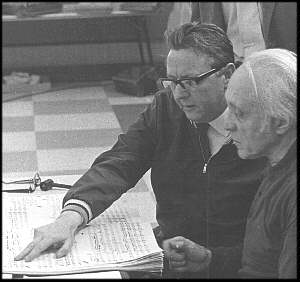 RS:
Neither of those things really is the explanation. I think what happens
is you follow the ideas of the music. Carl Nielsen said something marvelous.
He said, "What is most important is not what the composer wants, but what
the music wants." You have to follow what is necessary. And, incidentally,
I use his pencil – Carl Nielsen's pencil – which was given to me by his
daughter in 1965. I've composed everything with it since. He wrote all
his works for the last 6 years of his life with it. It was given to him
on his 60th birthday. It's a gold-plated propelling ever sharp pencil.
So maybe the pencil does do some of it. I don't know. (Laughs) Mahler is
not a composer I admire unreservedly, though I find him always fascinating,
but he said something I agree with. He said, "We do not compose. We are
composed." In other words, it's an argument against free will, I suppose.
RS:
Neither of those things really is the explanation. I think what happens
is you follow the ideas of the music. Carl Nielsen said something marvelous.
He said, "What is most important is not what the composer wants, but what
the music wants." You have to follow what is necessary. And, incidentally,
I use his pencil – Carl Nielsen's pencil – which was given to me by his
daughter in 1965. I've composed everything with it since. He wrote all
his works for the last 6 years of his life with it. It was given to him
on his 60th birthday. It's a gold-plated propelling ever sharp pencil.
So maybe the pencil does do some of it. I don't know. (Laughs) Mahler is
not a composer I admire unreservedly, though I find him always fascinating,
but he said something I agree with. He said, "We do not compose. We are
composed." In other words, it's an argument against free will, I suppose.
[Photo at right: With Jascha Horenstein]
BD: You have no free will at all?
RS: No, I don't think so. I think you just have to go the way the music insists on going. You have to say to yourself, "Does this feel right?" If it doesn't feel right, then you have to abandon it. If it does, you go on from there. It's a question of feeling. It's not just a question of making a detailed plan beforehand and working it out intellectually or making a patent which some composers do. It must be feeling or it will never arouse anybody else.
BD: When you're working with the score and tinkering with it, how do you know when to put the pencil down, when to say it is finished and ready to be launched?
RS: I get to the end. I start at the beginning and I get to the end. When I get to the end, I look back over it and I think to myself, is there anything I can improve. Quite often there is. But eventually it comes to a point when you think you can't do any more. I have to leave it at that. It's as good as I can make it. You have to be humble enough to know when to stop.
* * * * *
BD: Let me ask the great big philosophical question. What is the purpose of music?
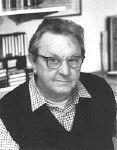 RS:
I don't know what is the purpose of anything, really. Music is one of these
things that we do which happens, which we have inside us. It's like all
the other things that we feel we need to do, we want to do. One thing I
would say is that any artist will produce something which says something
that he needs to say or feels he needs to say. He may not even know why
he needs to say it. He does it because he has to. I'm quite sure my own
music must reflect something of what I think and believe and feel even
though I may not be able to define it exactly. For instance, I could tell
you that I have strong, very strong views outside music. I am, for instance,
a pacifist and a vegetarian and I have these extremely strong convictions
about these matters which I stick to and they influence the whole of my
life. Therefore, they must influence my music. My being a pacifist must
influence it because I feel that the world is in very great danger. I think
that we now have the means to destroy everything on this planet 10 times
over and sooner or later, it's likely to be used, unless we can get rid
of it. I don't think we can get rid of it unless we get rid of violence.
RS:
I don't know what is the purpose of anything, really. Music is one of these
things that we do which happens, which we have inside us. It's like all
the other things that we feel we need to do, we want to do. One thing I
would say is that any artist will produce something which says something
that he needs to say or feels he needs to say. He may not even know why
he needs to say it. He does it because he has to. I'm quite sure my own
music must reflect something of what I think and believe and feel even
though I may not be able to define it exactly. For instance, I could tell
you that I have strong, very strong views outside music. I am, for instance,
a pacifist and a vegetarian and I have these extremely strong convictions
about these matters which I stick to and they influence the whole of my
life. Therefore, they must influence my music. My being a pacifist must
influence it because I feel that the world is in very great danger. I think
that we now have the means to destroy everything on this planet 10 times
over and sooner or later, it's likely to be used, unless we can get rid
of it. I don't think we can get rid of it unless we get rid of violence.
BD: Then, do you find that your music becomes political or a political statement?
RS: It becomes a statement about my feelings about the world. I can't really define it exactly. I can't tell you this bar means this or that, this movement means this or that. I can only try to write the kind of music that seems to me constructive and vital. It has positive energies in it. In other words, I think the artist's job is to try to spread as much sanity around him as he can, even if he feels the situation is hopeless, which, in fact, I do. I'm not optimistic about the future of the world. I think the world is going to come to a nasty, sticky end sooner or later. But, at the same time, I feel it's necessary to go on as if this is not the case. You need to just spread sanity around you because that's the only way in which you can influence events. You can talk, of course, as I'm doing now, but it's your work that will be there when you're gone.
BD: Would it be a huge mistake to play one of your symphonies for a General or an Admiral?
RS I don't know how it would be appropriate. It's difficult to say. I would hope that if a General or an Admiral heard one of my symphonies, it might influence them in certain positive ways. But I don't know. These are not questions which are easy to answer. Actually, vegetarianism is all part of the same thing, as far as I'm concerned, because I believe the root of the matter is violent. If the human race could get rid of violence, then it would be able to get rid of nuclear weapons, and it would be able to get rid of war altogether. But it's violence that's created nuclear weapons. I also believe that if we are going to ever stop killing and mutilating and murdering each other, the first step we have to take is take to stop doing it to the defenseless, speechless fellow creatures that we feed on or just kill for the sake of pleasure. So that's the beginning. That's the first step we have to take if we're ever going to stop killing each other.
BD: So your music does reflect this whether you try to have it in there or not?
RS: Yes. I think my music also reflects some violence too. There's a good piece of violence in the world because you can't just bury your head in the sand and close your eyes to everything and turn your back on it.
BD: You try to show violence for what it is and try to get people to see the horror of it?
RS: Well, I try to put violence in some kind of context of sanity and say, "There it is, and what are we going to do about it?" These things are rather difficult to talk about, aren't they?
BD: Of course, but they are in your music.
RS: I would hope so. I'm not conceited enough to think I've succeeded.
* * * * *
BD I assume you continue to write every day.
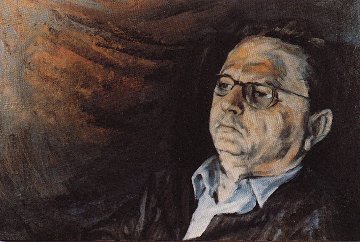 RS:
Yes. Most days. I work in the mornings. I moved here to Ireland, which
is a lovely, peaceful country. It's very beautiful. We live about 300 feet
up the side of a mountain overlooking the Atlantic Ocean and we can see
mountains and fields and beaches. Miles and miles of sandy beaches. There's
nobody on them.
RS:
Yes. Most days. I work in the mornings. I moved here to Ireland, which
is a lovely, peaceful country. It's very beautiful. We live about 300 feet
up the side of a mountain overlooking the Atlantic Ocean and we can see
mountains and fields and beaches. Miles and miles of sandy beaches. There's
nobody on them.
BD: Sounds wonderful.
RS: Oh, it's wonderful. And the contrast with London is magnificent. So I work here every morning after breakfast until lunchtime. If I feel like going on after that, then I do. If I don't, I do something else. There are 2 dogs here and 3 cats.
BD: Are the works that you write on commission or are they things you just feel you have to write?
RS: Most of the works are commissioned. I seem to have quite a list of commissions at the moment to work through before I can do anything on my own. That really doesn't make all that difference. Somebody asks me to write a string quartet, then it's going to be my string quartet. I start with it. You're entirely free when you have a commission, to write what kind of music that you want.
BD: How do you decide which commissions you will accept and which you'll decline?
RS: It depends. I like to try to accept most things because if I haven't done it before, it's a challenge, something that I would like to attempt. Julian Bream, for instance, wants me to write him a guitar piece. This terrifies the life out of me because I don't know anything about the guitar. I had a session with him and he showed me a few tricks and I shall have a crack at it.
BD: Good luck with it! What is the Robert Simpson Society?
RS: Well, that is a lot of very nice people who got together to try and do something for my music. I had nothing to with it. In fact, I tried to discourage them in the first place because I think often these pressure groups can create resistance as much as enthusiasm. Enthusiasm is often counterproductive so I tried to dissuade them. But they were very determined and they managed to do quite a lot. They helped get some of the records made and they've spread quite a lot of information about. They're just about to bring out a little booklet about my music, about my symphonies. It's articles and things by different people about the different symphonies.
BD Are most of the things that are written about your symphonies and other works accurate?
RS: Well, they vary. As Sibelius said, "Nobody ever erected a statue to a critic."
BD: As you approach your 70th birthday, are you pleased with where you stand in terms of your music and other music?
RS: I don't know. I look back on what I've done so far and I think, well, I could have done a lot better. I think I might have done a little better. I don't know. In comparison with other music, I wouldn't like to venture at all. The great ideal in my musical life has always been Beethoven. He is, for me, the greatest composer that ever lived. I am continually learning from him about humanity as well as about music, and he's been an enormous inspiration for me. There are other composers that I've been inspired by. I think influences are very important. I don't think a composer should be afraid of it, but I think that's one of the troubles today. People are scared stiff of showing the influence of somebody. They think they must be absolutely different in every conceivable way, for them to start from nothing - a vacuum. Your influences are what you are. Like the food you eat, you are what you eat, aren't you? The music you absorb is what has formed you. If you'd never heard any music, I would think you would never want to be a musician. So that's the important thing. You should embrace influences enthusiastically.
BD: Is composing fun?
RS: It's absorbing. It's totally absorbing. It's very exhausting, of course. You've got to give it everything you've got. And it's exciting. Fun is not a word I'd use, really. It's exciting and sometimes exasperating and terrifying and all kinds of things. I wouldn't do anything else. I'm not capable of doing anything else. My hobby is astronomy, actually, with a telescope. That's the only other thing I know much about.
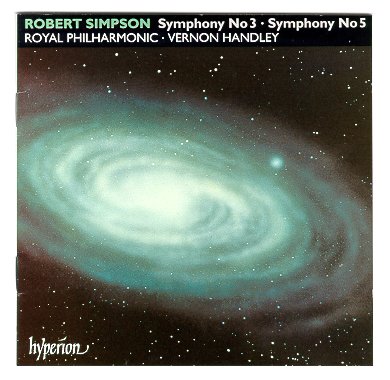 BD
Are you getting influences from the stars?
BD
Are you getting influences from the stars?
RS: Well, I don't know. I am fascinated, of course, by the immensity of the universe, and the awesome nature of everything. I suppose that might creep into the music somehow.
BD: Do you feel that the music you write would be accepted on other celestial bodies?
RS: Ha! I don't know about that. I don't even know if they have any music on other celestial bodies. (laughter)
BD: Do you have any advice for other composers?
RS: Well, I would say do what you feel is right and be absolutely honest with yourself. Be ruthlessly brutally honest with yourself. When you write something down, say to yourself, "Does this feel right?" If it doesn't, get rid of it. If it does, hang on to it and work on it. Be absolutely, brutally honest with yourself. That's the only advice you can offer anybody. I would never teach composition because I don't really think it's possible. I don't know really how I do it myself so how the heck can I tell anybody else?
BD: I assume it's a combination of inspiration and technique.
RS: Yes. Well, it's experience. Technique is only experience, really, knowing what you can do with material. You're finding out new things all the time. There is no such thing as a regular, established technique. So-called technique develops as you work and changes as your ideas change. Your ideas dictate technique and becomes your music.
BD: Well, I am very glad that the world is able to absorb the music of Robert Simpson.
RS: Well, thank you. I hope it won't want to spit it out after it's absorbed it.
BD: (laughs) I'm sure not. I'm sure not. I appreciate you spending some time with me this afternoon. I have learned a lot about your music and about your ideas
RS: Well, come over to Ireland and see us here. You're very welcome.
BD: Thank you for the invitation. I will try to come at some
point. Thank you so very, very much.
= = = = = = =
- - - - -
= = = = = = =
© 1991 Bruce Duffie
This conversation was recorded on the telephone on January 5, 1991 in Chicago, and portions were broadcast on WNIB in 1991 and 1996.
Photo of Robert Simpson with Jascha Horenstein at the Unicorn Recording of his Third Symphony, courtesy of Reg Williamson
The Proms & Natural Justice by Robert Simpson, published by Toccata Press, 40 Floral Street London WC2 £1.95 ISBN 0 907689 00 0
From Toccata Press about the book...In this important and provocative book Dr Robert Simpson, one of Britain’s finest composers and for nearly thirty years a BBC music producer, scrutinises the methods by which the BBC plans the annual Promenade Concerts. Currently, the Controller of the Proms has the absolute right of control over Proms programmes. Basing his argument on long experience inside the BBC, Dr Simpson argues that whoever the Controller might be, the effects of his individuality are bound to colour the programmes over time, excluding important composers and performers whom he happens to dislike. The only logical way to give the Proms the flair that a single imagination can provide – without those otherwise inevitable long-term imbalances – is to limit the tenure of the Controller to four or five years. Dr Simpson further examines the artistic gains and financial savings to be made from more extensive use of the BBC’s own orchestra. Not only would this measure produce a saving of a staggering 62% of costs; it would also give the Controller almost total control of the repertoire. This would enable the Proms to become more adventurous than ever before – a true realisation of Sir Henry Wood’s original vision.
Award - winning broadcaster Bruce Duffie was with WNIB, Classical 97 in Chicago from 1975 until its final moment as a classical station in February of 2001. His interviews have also appeared in various magazines and journals since 1980, and he now continues his broadcast series on WNUR-FM, as well as on Contemporary Classical Internet Radio.
You are invited to visit his website
for more information about his work, including selected transcripts of
other interviews, plus a full list of his guests. He would also like
to call your attention to the photos and information about his
grandfather, who was a pioneer in the automotive field more than a
century ago. You may also send him E-Mail
with comments, questions and suggestions.